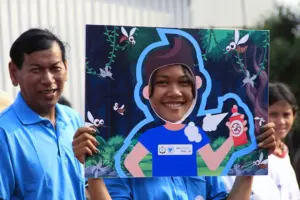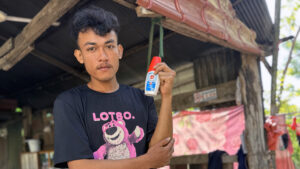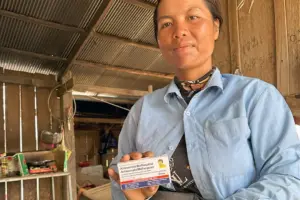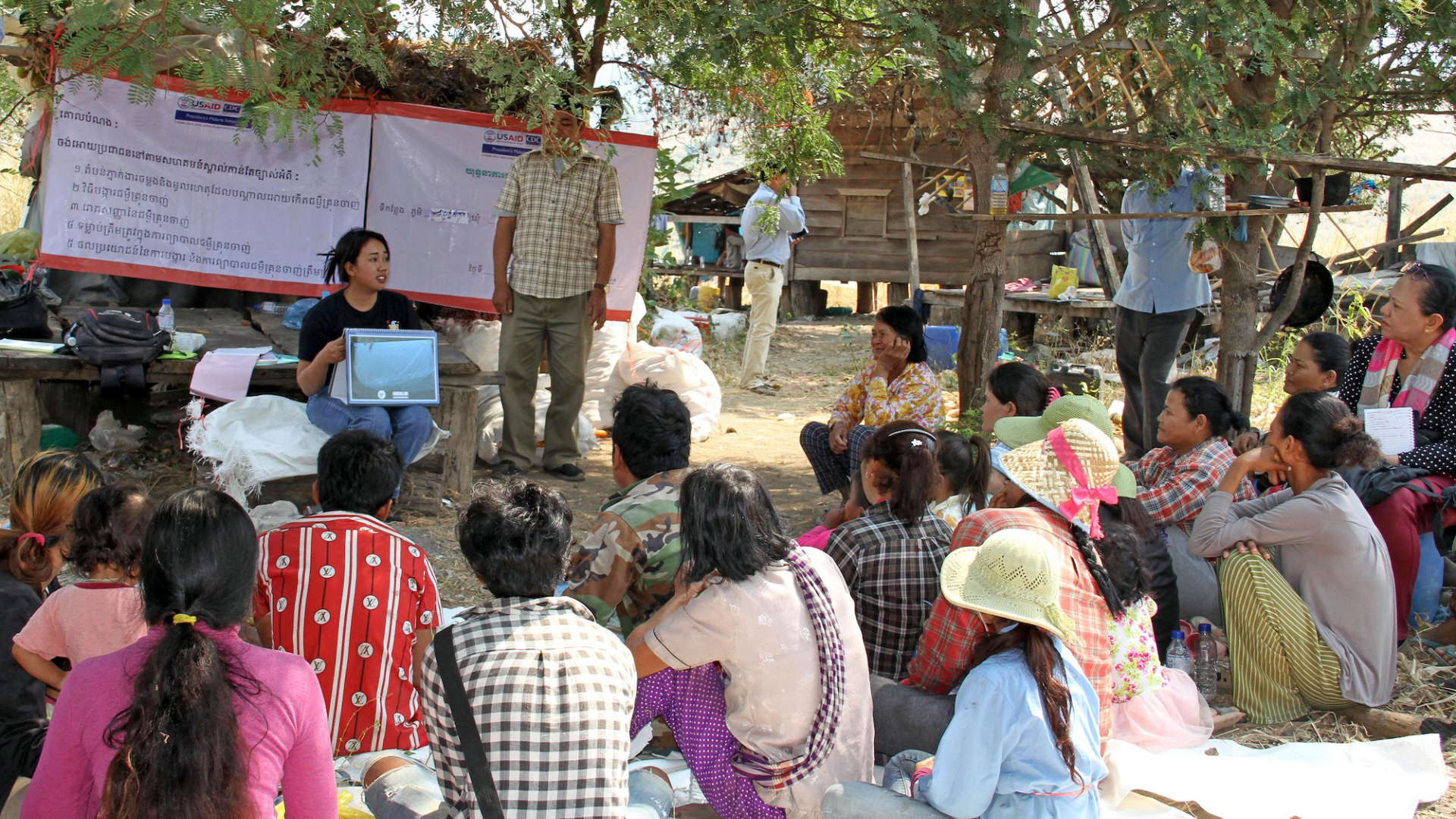
Malaria
Cheum Srey Kung (holding visual aid) – a 26-year-old mobile malaria worker with the Cambodia Malaria Elimination Project (CMEP) – co-conducts a health education campaign for residents in Kampong Lapov Village, Battambang Province. Photo credit: CMEP/URC
Malaria
URC has led projects to reduce the impact and spread of malaria in more than 20 countries in Latin America, the Caribbean, Africa, and Asia since 2003. Our activities have contributed to the halving of global annual malaria deaths between 2000 and 2018, declining to just over 400,000, according to the World Health Organization.
We continue to contribute significantly to malaria control efforts globally and support ministries of health to transition programs to elimination efforts through projects we are leading in Asia and Africa. Our programs:
- Strengthen surveillance systems and enhance procurement and logistics to ensure a reliable supply of high-quality drugs and diagnostics;
- Ensure providers – including the private sector – have the necessary skills, medicines, and equipment for intermittent preventive treatment during pregnancy and that malaria services are accessible to all vulnerable groups;
- Work with all levels of government and community-based organizations to follow global guidance for the promotion, distribution, and utilization of long-lasting insecticide-treated nets; and
- Strengthen communities’ ability to access and utilize quality malaria services, especially for vulnerable groups, and provide malaria prevention education through social and behavior change campaigns.
Cambodia has experienced zero malaria deaths since 2018 and malaria cases decreased by 97% between 2000 and 2022, according to statistics from the Cambodia National Malaria Control Program. USAID/President’s Malaria Initiative (PMI) projects implemented by URC between 2007 and today – including the ongoing Cambodia Malaria Elimination Project 2 (CMEP2) – have contributed significantly to these successes, putting Cambodia on track end malaria by 2025.
There have been zero malaria deaths in Cambodia since 2018, and Cambodia is on track to eliminate Plasmodium falciparum (Pf) malaria by 2023 and all species of malaria, including Plasmodium vivax (Pv), by 2025. Challenges remain in preventing malaria re-introduction and scaling up elimination efforts nationally and within high-risk populations, including forest workers and mobile and migrant populations.
CMEP2 – CMEP’s successor project – launched in September 2021, is working to eliminate malaria, prevent its re-introduction in target provinces, and advance a self-reliant, sustainable, self-financing malaria program in Cambodia.
CMEP2 also is focusing on transition of ownership and responsibility for service delivery from the project to government counterparts. Operational districts increasingly plan, implement, and monitor activities, with the project providing technical assistance and capacity building.
Under CMEP 2, every confirmed malaria case in the Cambodia has been treated according to national treatment guidelines and 95% of the cases were handled by the 1-3-7 approach: case notification on day one, 100% case investigation/classification and response by day three, and foci investigation by day seven, then continued by foci management for any identified active foci.
In Myanmar, the USAID/PMI Defeat Malaria Activity is strengthening the Myanmar health system to respond to changing epidemiological situations, including multi‐drug resistance and insufficiently sensitive malaria testing. Defeat Malaria works in regions with high malaria incidence and hard-to-reach migrant groups, scaling up proven interventions to ensure treatment compliance and identify cases of drug-resistant malaria.
Achievements include:
- Testing and case finding: 915,316 people have been tested for malaria through the activity. 14,260 positive cases were detected and 14,104 (99%) were treated.
- Local engagement and sustainability: 44 community support groups have been established in Rakhine State, Kayin State, and Tanintharyi Region. The project supported the creation of Malaria Elimination Coordination Committees and malaria elimination plans of action at the three townships.
- Health communication: Defeat Malaria has reached 810,628 individuals through interpersonal communication and health talk sessions, including 116,706 migrant workers.
Also in Myanmar, the new USAID/PMI Eliminate Malaria Activity (PMI-EM), started program implementation in October 2021 in collaboration with Myanmar’s National Malaria Control Programme and other implementing partners, including PATH and Alight.
Building on Defeat Malaria’s impact, this 5-year activity works in regions with high malaria incidence and with hard-to-reach migrant groups, scaling up proven interventions to ensure treatment compliance and identify cases of drug-resistant malaria. PMI-EM is contributing to the elimination of the indigenous transmission of Pf malaria by 2025 and helping to put Myanmar on the path to eliminate all human malaria by 2030.
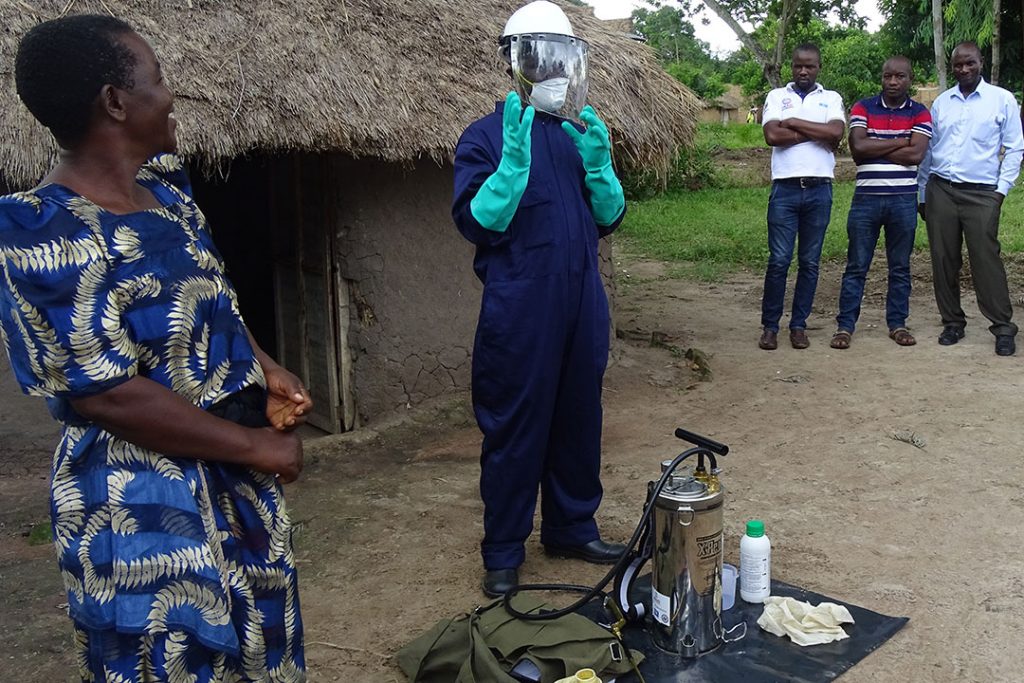
In Uganda, the Regional Health Integration to Enhance Services in Northern Uganda (RHITES-N, Acholi) Activity and the Regional Health Integration to Enhance Services in East Central Uganda (RHITES-EC) Activity – are working to reduce the burden of disease, including malaria.
RHITES-N, Acholi has reduced the malaria burden by helping to increase the proportion of malaria cases confirmed by either rapid diagnostic tests or microscopy from 77% to 98% in the activity’s first three years. For the same period, the proportion of confirmed cases that were appropriately treated increased from 56% to 97%.
RHITES-EC helped health facilities implement test and treat policies, leading to an increase in the proportion of malaria cases treated for malaria from 60% at the start of the activity to 98% four years later. The activity also helped decrease the number of patients inappropriately treated for malaria from 70% to 1.9% in four years.
